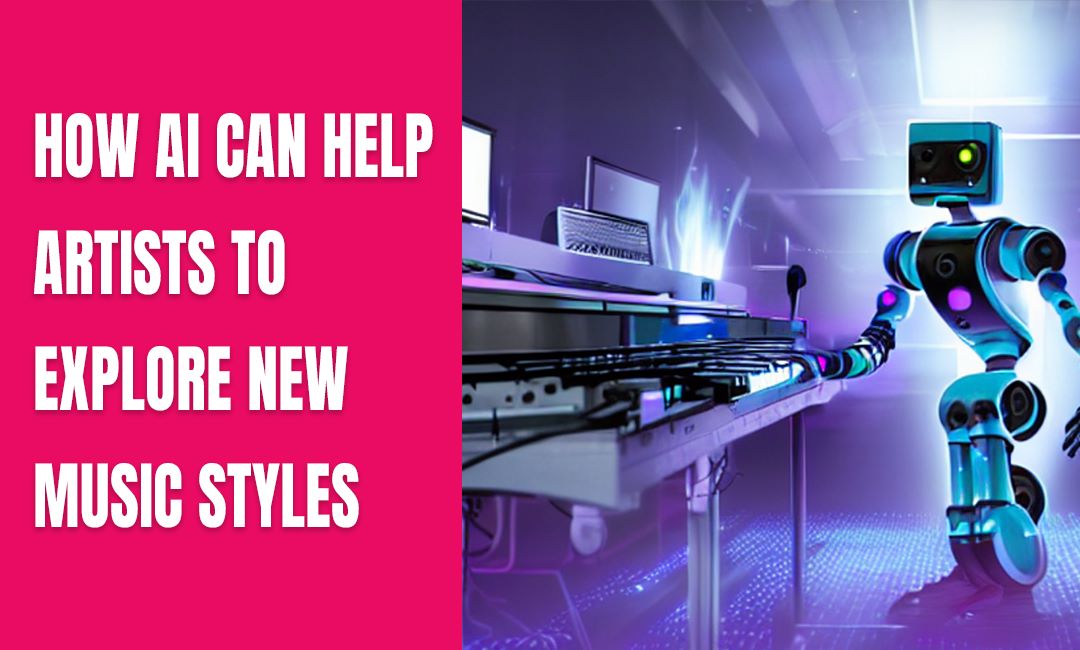How AI Can Help Artists To Explore New Music Styles

8-Aug-2023
Music has always been a constantly evolving art form, pushing boundaries and exploring new frontiers. From hip-hop to rap, rock anthems to electronic beats, music artists have always strived to create unique. Artificial intelligence (AI) has emerged as a powerful tool in recent years, opening up exciting possibilities for exploring new musical genres and styles. Let us delve into the world of AI song maker and know how it reshapes the landscape of music creation.
Exploring existing genres
Today we have massive datasets of existing music from a specific genre, which AI systems can analyze. AI algorithms can generate new compositions that sound like they belong to a genre by learning the patterns, chord progressions, melodies, and stylistic elements of that genre. This capability enables music artists and composers to experiment with various established genres, combining them in novel ways or pushing them to their limits.
We have several music artists using AI song makers to explore existing genres in innovative ways. Some of the examples are:
-
The electronic music artist and composer, Holly Herndon, incorporates AI to create unique and experimental compositions that blend electronic music with avant-garde and pop influences.
- While Chagall, a singer-songwriter and electronic music artist, incorporates AI and motion tracking into her performances. These respond to her movements on stage, creating interactive visuals and generating live electronic sounds. Her performances blur the lines between music, art, and technology, giving the audience a one-of-a-kind experience.
Creating new genres
AI is capable of creating entirely new musical styles in addition to exploring existing genres. Music artists can generate compositions that blend elements from multiple genres or even invent new sounds by training AI models on diverse musical genres and styles. AI algorithms can generate melodies, harmonies, and rhythms that human composers may have overlooked, resulting in unique and unprecedented musical expressions.
Music artists are experimenting with AI song makers to create something unique and exceptional. Some of the examples are:
-
Poppy, a singer-songwriter and internet personality, uses AI in her music to create a unique blend of pop, electronic, and experimental genres. She works with AI developers to generate surreal and unconventional vocal and musical elements, resulting in a genre, "post-genre" or "internet pop."
- Another is David Rosenblad who uses AI algorithms to generate intricate and complex compositions that blend elements of classical, electronic, and ambient genres. The result is a genre-defying sound that is often described as "AI-infused neoclassical."
Collaborative creativity
AI also opens up new opportunities for music artists and machines to collaborate. Artists can explore uncharted territory with AI as a creative partner. They can feed ideas or melodies into AI systems, which can then expand or improve on them. AI song makers can suggest new chord progressions, harmonies, or rhythmic variations that artists may not have considered on their own, serving as a source of inspiration and broadening creative possibilities.
Some examples of music artists using AI as collaborators for their music creation are
-
Tim Exile, an electronic music artist and innovator, has extensively used artificial intelligence in his music. He developed the "SLOO" AI system, which acts as a virtual collaborator, generating musical ideas and responding to his live performances.
- Yuka Honda, a multi-instrumentalist and producer, has worked on AI-powered projects. She collaborated with AI researchers to create a system that analyses her musical ideas and generates complementary parts using machine learning. Honda's collaboration with the AI system enables the creation of music that combines human intuition with AI-generated creativity.
Challenges and ethical considerations
While artificial intelligence has enormous potential for exploring new musical genres and styles, it is not without challenges and ethical concerns. The issue of copyright and ownership is one of the most pressing concerns. It becomes challenging to decide who owns the rights to a piece of music created by an AI system. When AI is used in collaborative settings, the question becomes even more complicated.
Another source of concern is the loss of human expression and emotion in music. The depth of human emotion and personal experiences that artists bring to their music may be lacking in AI-generated compositions. While artificial intelligence can mimic existing styles, it may struggle to capture the intangible qualities that make music moving.
Conclusion
Artificial intelligence has ushered in a new era of musical exploration, allowing music artists and composers to explore uncharted territory and create ground-breaking works. AI song makers provide a wealth of opportunities for expanding the boundaries of musical expression, whether by analyzing existing genres or inventing entirely new ones. However, it is critical to view AI as a tool that enhances rather than replaces human creativity. By embracing AI as a collaborator, artists can explore new territory while preserving the soul and emotional depth of music. As AI advances, the future of music will be an exciting blend of human and machine creativity.
ZOOM Recording Studio, the top music recording studio in Los Angeles, is well-equipped with the latest tools and technology that help music artists in creating unique music.
Read Similars Blogs:
AI SECRETS TO SUPERCHARGE YOUR SOUND